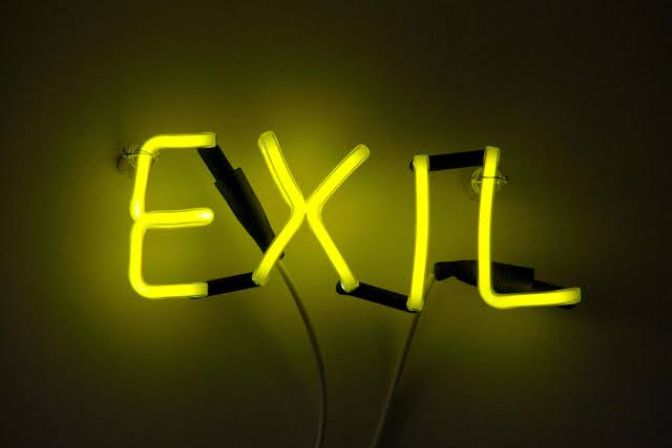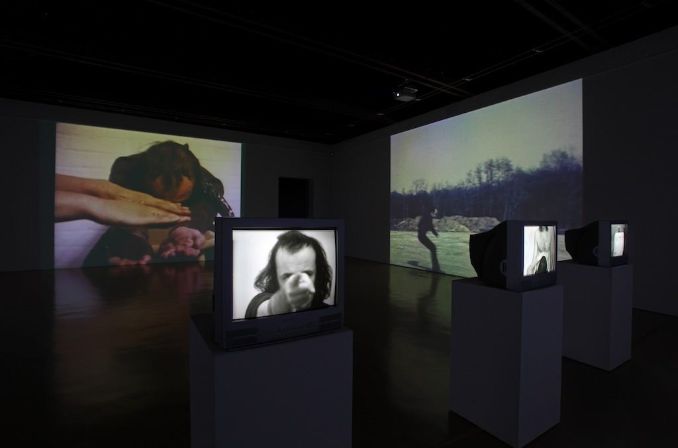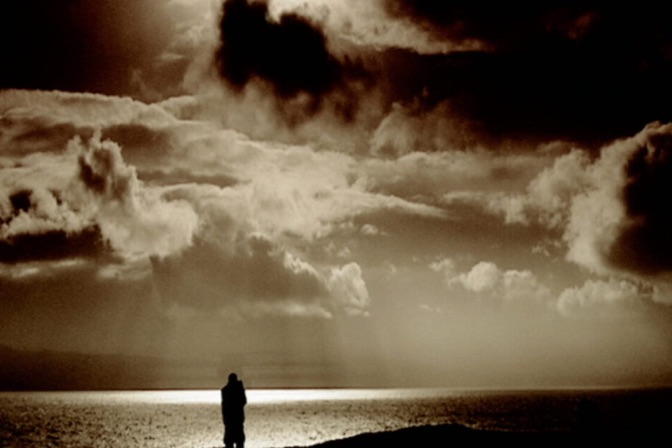Expulsion from the Garden of Eden, a solo exhibition of video and mixed media by British artist Adam Chodzko (b. 1965, London), was produced during a two-month international residency in Japan. This was the artist’s first solo show in a Japanese gallery.
The exhibition presents a suite of works exploring Chodzko’s ongoing investigations into how communities connect with their sense of self, place, history, and the world beyond. In Rupture 2015, Chodzko examines what may be revealed or concealed in such encounters—between gallery, audience, neighbour, art object, and foreign artist—through interwoven mythologies that blur documentary ‘truth’ with science fiction to convey a psychological surrealism. Acts of empathy become transformation: a gallery becomes a human body, a group of people become strangers in a 1960s postcard, the artist becomes parts of trees in the gallery garden. These processes are visualised as a form of ‘folding.’
Expulsion from the Garden of Eden also considers the idea of a ‘Mixed Bathing World’—the theme of the Beppu Triennial—from a Western European artist’s outsider perspective. This idealised view of communal innocence is mapped onto two found postcards (from Henrico, Virginia, and Tampa, Florida), both based on the same 1963 photograph of people passing through a Beppu arcade. One is a black-and-white image showing two girls in the foreground; the other, hand-coloured, crops them out and fabricates details. This revision casts doubt on the photographic ‘truth’ and triggers a process of deconstruction by a group of participants in Kannawa, who reflect on the image’s psychological and communal dimensions. Ideas of innocence, shame, and exile unfold through this ‘return,’ with Beppu’s steam becoming a metaphor for emotional release and uncontrollable knowledge.
In Somewhere Else, In Order to Complete Them, a myth is recounted in which artists are credited with shaping Beppu’s identity, even attributing the city’s constant steam eruptions to a 1970s artist intervention. Chodzko links his own practice in Kent, UK, to these Beppu eruptions, suggesting a deep, geological connection. A series of moving image works—from slide projections to video—are shown in Beppu’s Kannawa area but also ‘reach out’ to other locations such as Governors Island (New York), Athens, and Belgrade. A video installation capturing Japanese audiences watching the work in Fujiya Gallery was later shown in the UK, again questioning where and how we locate ourselves in the world. The monitor playing this video and its surrounding environment within Fujiya Gallery was filmed, during the exhibition, being encountered by a Japanese audience. The resulting ‘video of a video’ was presented in an exhibition Chodzko in the UK, at Sidney Cooper Gallery, Canterbury, again to call into question where and how we might be in the world.
Watch >> Film
In Our Host Postponed the Drinks Until After the Storm, the ‘host’—perhaps the artist or the gallery itself—reaches out to neighbouring buildings via a proposed bamboo plumbing system, designed to deliver a drink between neighbours. This exchange is interrupted by a looming storm, leaving the gallery’s ‘arms’—the bamboo structures—pruned and bandaged in the garden. Inside, the gallery holds what remains of the system, now a ‘useless’ art object. Photographs of the neighbours show them endlessly waiting to complete their exchange.
In Here., a pair of momohiki (Japanese agricultural work trousers) and the pruned branches of all trees in the Fujiya Gallery garden form the work. Each branch pointing to a bearing of 280°43′00′′—the direction of Chodzko’s home in Whitstable, Kent—is cut. This subtle intervention alters the garden permanently. The artist hides his action within the momohiki, suggesting a concealed shame. Yet, like a dream revealing what we try to suppress, the amputated branches—clad in the trousers—appear to walk away, returning home.
Chodzko has exhibited at major institutions worldwide, including Tate Britain, Tate St Ives, Venice Biennale, PS1 New York, Ikon Gallery, the Henry Moore Institute, and the Folkestone Triennial. His work has been commissioned by Creative Time (New York), Frieze Art Fair, Hayward Gallery, and Film and Video Umbrella. He has also featured in British Council-curated exhibitions, from General Release (Venice Biennale, 1995) to Private Utopia (Japan, 2014).
Expulsion from the Garden of Eden was curated by Keith Whittle and commissioned and co-produced with Beppu NPO as part of the Kashima Artist in Residence 2015, supported by the Agency for Cultural Affairs, Government of Japan.

























